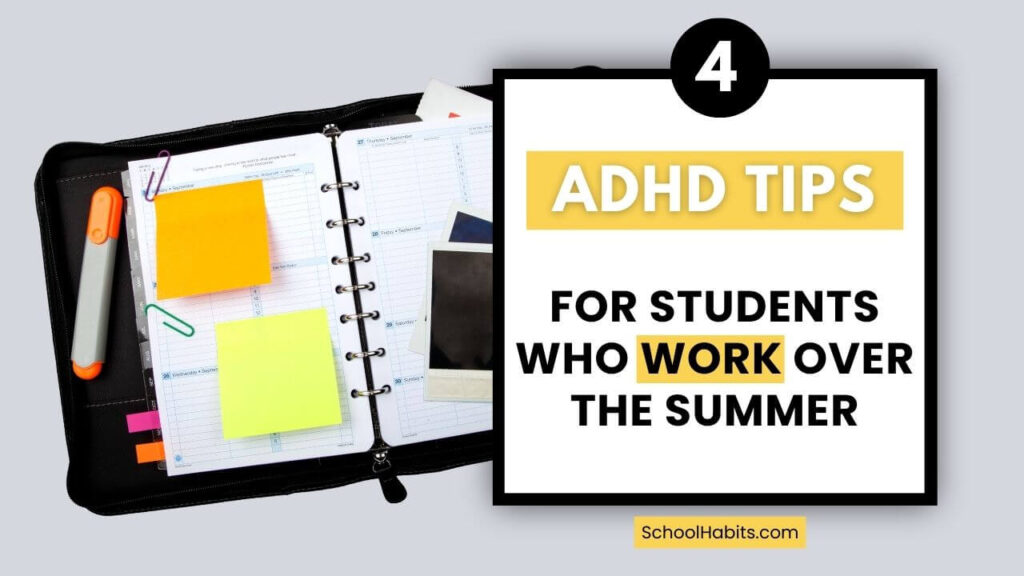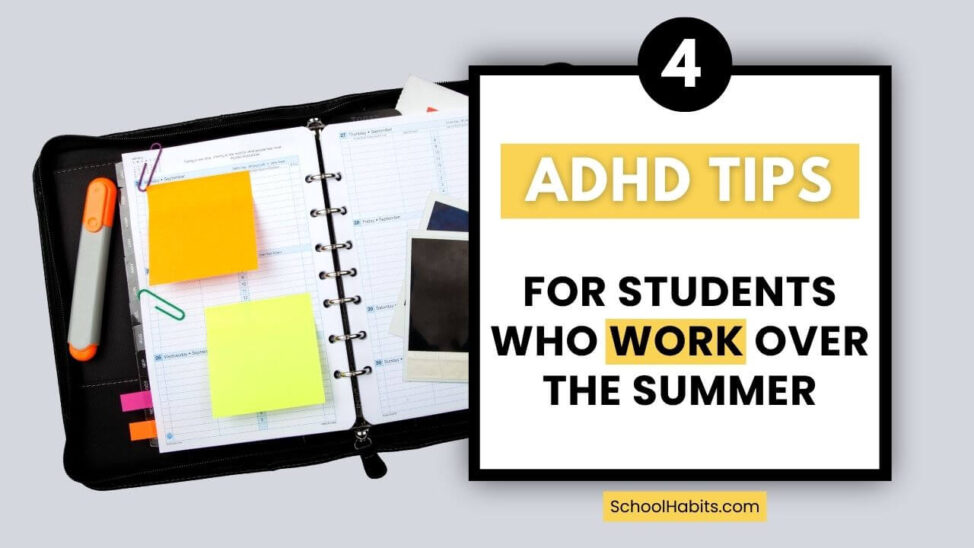
Katie Azevedo, M.Ed.
If you’re a student, working over the summer is a great way to earn money, make connections, build skills, and enjoy your school break doing something other than sitting around.
But if you’re a student with ADHD, working over the summer can have its challenges. Why? Because people with ADHD need more support with their executive functions, and all jobs require adequate executive functions.
As a reminder, our executive functions are a collection of cognitive skills that let us operate independently. Executive functions include:
- Planning
- Organization
- Time management
- Task initiation
- Prioritization
- Flexible thinking
- Working memory
- Self-monitoring (metacognition)
In this blog post, I share 4 ADHD tips for students who work over the summer. If you don’t yet have a summer job and you’re wondering how to get one, here are my top tips.
4 ADHD Tips for Students Who Work Over the Summer
If you’re a student with ADHD, and you want to get and hold a summer job, it’s important to optimize your conditions to support your executive functions. The following 4 tips are designed to support your executive functions so that you can put all your focus into enjoying and doing your job, and not just managing it.
1. Use a Calendar
If you have ADHD, you’ve heard the advice to use a calendar at least a million times by now. Some of my clients with ADHD roll their eyes at this advice, but it’s one of those ADHD strategies that’s truly non-negotiable.
Many summer jobs have inconsistent schedules and varying hours each week. This can be an executive function nightmare for people with ADHD (and for people without ADHD!).
While there are benefits to paper calendars, I suggest people with ADHD use a digital calendar to manage their summer work hours. Google Calendar is perfect for this, as there’s an app for iPhones and Androids, and it’s super easy to use.
Whether your boss gives you your schedule a week in advance or a month in advance, add your work hours to your digital calendar the moment you get them. ADHD can distort your sense of time and urgency, so if you don’t do something right away, there’s a chance it won’t get done at all.
Here is my Google Calendar tutorial for students, and the step-by-step instructions are perfect for managing a summer job schedule.
Another ADHD tip for using a digital calendar is to keep the app only one touch away on your phone’s home screen. In other words, don’t hide it in a folder or on a screen you have to swipe to.
Disorganized? Here are the top 4 areas to organize over the summer if you’re a student.
2. Choose a Job That Aligns with Your Energy Cycles
Part of successfully managing ADHD – not just over the summer but in general – is knowing yourself well enough to see patterns in your energy cycles.
Are you a night owl? Can’t get out of bed before noon? Then don’t look for a job that starts at 7 AM. We can’t always control every aspect of our schedules, but when we can, we should.
If you take medication for your ADHD, you may also want to time your dosage to sync with your work schedule. Obviously speak to your physician about your medications before making any changes, as I am not a doctor and I do not offer any medical advice regarding medicine, ADHD or otherwise.
3. Establish a Clear Communication Channel
All jobs require communication between you and a superior. Some jobs use text messages, email, work-specific apps, or phone calls. When you have a summer job, it’s important to have total clarity about who you’re supposed to communicate with and how.
Why is this so important for students with ADHD? Because having too many choices often leads to making no choice. In other words, if you need to make a change to your work schedule, and you don’t know whether to call Gary or text Sarah or email Chase, you might end up overwhelmed and not communicating at all.
Here’s the strategy: On your first day at work, ask your manager who you should contact and how. Store this information in your phone contacts. In the company field, include your company name so you can easily search for the contact if you happen to forget the person’s name. (You won’t forget the name of the company you work for.)
4. Add Relevancy by Setting a Savings Goal
New summer jobs can be exciting at first because they’re full of novelty. Novelty (newness) is a primary ingredient in motivation. That means that in the first few weeks of your summer job, you might have no problem getting out of bed and showing up to work on time. But novelty can fade fast, and when you have ADHD, that means trouble.
To increase your chance of success at your summer job, and to keep your motivation high, you can add another magic ingredient of motivation: relevance.
When we don’t see the immediate relevancy of what we’re doing, it can feel nearly impossible to do it. That means if you enjoyed your ice-cream-scooping job for the first two weeks but now you don’t see how it’s relevant to your life goals, you might start to lose motivation and start not showing up to your job.
My suggestion is to add relevancy by setting a concrete savings goal. Money is always relevant to us, and so shifting your focus away from ice cream to money can improve your work motivation.
You could set a total savings goal for the whole summer (I want to save $2500 before I return to school in the fall) or a savings goal for each week (I want to save $250 per week). These monetary goals can motivate you enough to show up to work even on the days you don’t want to.
Additional ADHD Tips for Students with Summer Jobs
Here are a few more tips that might be helpful if you have ADHD and you’re working a summer job:
- Choose a job you have a real interest in; this increases motivation
- Consider getting a job with a friend (this adds accountability)
- Before you commit to a job, make sure you have a way to get there and back (Do you drive? Do you need a ride?)
- Update your student resume with your work experience before your job is over. If you wait until the end of summer, you could forget to make the updates altogether
- When your job is over for the summer, end on a positive note; you may want to return to the job the following year or ask your boss for a recommendation letter in the future
- More tips for how to improve your executive functions over the summer

